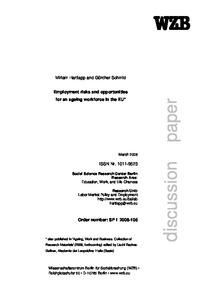Well-being and inequality
"An objective and a subjective approach to study well-being is introduced. The objective approach is particularly useful to compare the quality of life of given societies across time and space. Using the objective approach, we can identify strong differences of quality of life between European...
| Main Authors: | , |
|---|---|
| Institution: | ETUI-European Trade Union Institute |
| Format: | TEXT |
| Language: | English |
| Published: |
Berlin
2008
WZB |
| Subjects: | |
| Online Access: | https://www.labourline.org/KENTIKA-19291094124910192769-Well-being-and-inequality.htm |
| Summary: | "An objective and a subjective approach to study well-being is introduced. The objective approach is particularly useful to compare the quality of life of given societies across time and space. Using the objective approach, we can identify strong differences of quality of life between European countries. In comparison to Western Europe, East European countries tend to have a rather low quality of life. Austria, the Netherlands, Sweden, Denmark and Belgium form a cluster of countries with high quality of life. The subjective approach to study well-being is useful for investigating the importance of dimensions of social inequality for people themselves. It is shown that most of the inequality dimensions traditionally analysed by social scientists affect people’s subjective well-being. However, it is also shown that some of the more materialistic inequality dimensions (such as income) tend to be less important in rich societies, while certain non-materialistic dimensions (such as family) are getting more important. The subjective approach to study well-being is also used to investigate the importance of characteristics of societies for people’s well-being." |
|---|---|
| Physical Description: | 47 p. Digital |

